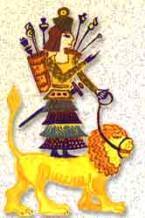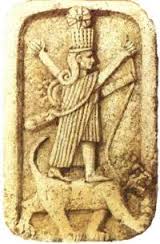http://mcadams.posc.mu.edu/txt/ah/assyria/inscra02.html
(Texts: All Artifacts, Color Coding, & Writings in Bold Type With Italics Inside Parenthesis, are Added by Editor R. Brown, not the Authors, Translators, or Publishers!)
(gods in blue …mixed-breed demigods in teal…)
Column 1
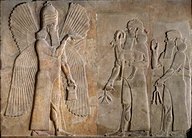 (giant god Ninurta, & mixed-breed king with dinner offering)
(giant god Ninurta, & mixed-breed king with dinner offering)
[1.1] To Ninip (Ninurta) most powerful hero, great, chief of the gods, warrior, powerful Lord, whose onset in battle has not been opposed, eldest son (of Enlil‘s),
[1.2] crusher of opponents, first-born son of Nukimmut (Ninhursag), supporter of the seven, noble ruler, King of the gods the producers, governor, he who rolls along the mass
[1.3] of heaven and earth, opener of canals, treader of the wide earth, the god who in his divinity nourishes heaven and earth, the beneficent,
[1.4] the exalted, the powerful, who has not lessened the glory of his face, head of nations, bestower of scepters, glorious, over all cities a ruler,
[1.5] valiant, the renown of whose scepter is not approached, chief of widespread influence, great among the gods, shading from the southern sun, Lord of Lords, whose hand the vault of heaven
[1.6] (and) earth has controlled, a King in battle mighty who has vanquished opposition, victorious, powerful, Lord of water-courses and seas,
[1.7] strong, not yielding, whose onset brings down the green corn, smiting the land of the enemy, like the cutting of reeds, the deity who changes not his purposes,
[1.8] the light of heaven and earth, a bold leader on the waters, destroyer of them that hate (him), a spoiler (and) Lord of the disobedient, dividing enemies, whose name in the speech of the gods
[1.9] no god has ever disregarded, the gatherer of life, the god(?) whose prayers are good, whose abode is in the city of Calah, a great Lord, my Lord – (who am) Assur-nasir-pal (II), the mighty King,
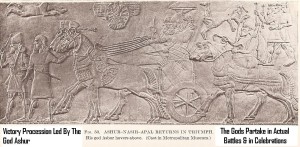 (Ashur above Ashurnatsirpal II from above in his sky-disc)
(Ashur above Ashurnatsirpal II from above in his sky-disc)
[1.10] King of multitudes, a Prince unequaled, Lord of all the four countries, powerful over hosts of men, the possession of Bel (Enlil) and Ninip (Ninurta) the exalted and Anu
[1.11] and of Dakan (unidentified?), a servant of the great gods in the lofty shrine for great (O Ninip) is thy heart; a worshipper of Bel whose might upon
[1.12] thy great deity is founded, and thou makest righteous his life, valiant, warrior, who in the service of Assur (Osiris) his Lord hath proceeded, and among the Kings
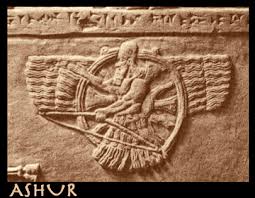 (Ashur in his weaponized winged sky-disc)
(Ashur in his weaponized winged sky-disc)
[1.13] of the four regions who has not his fellow, a Prince for admiration, not sparing opponents, mighty leader, who an equal
[1.14] has not, a Prince reducing to order his disobedient ones, who has subdued whole multitudes of men, a strong worker, treading down
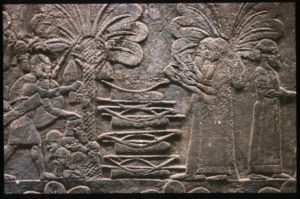 (scribes count the severed heads of the enemy)
(scribes count the severed heads of the enemy)
[1.15] the heads of his enemies, trampling on all foes, crushing assemblages of rebels, who in the service of the great gods his Lords
[1.16] marched vigorously and the lands of all of them his hand captured, caused the forests of all of them to fall, and received their tribute, taking
[1.17] securities, establishing laws over all lands, when Assur the Lord who proclaims my name and augments my Royalty
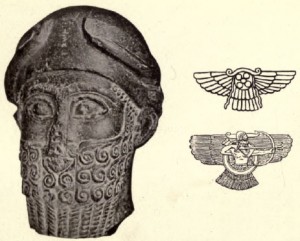 (Ashur, patron god of Assyria with sky-disc)
(Ashur, patron god of Assyria with sky-disc)
[1.18] laid hold upon his invincible power for the forces of my Lordship, for Assur-nasir-pal, glorious Prince, worshipper of the great gods
[1.19] the generous, the great, the powerful, acquirer of cities and forests and the territory of all of them, King of Lords, destroying the wicked, strengthening
[1.20] the peaceful, not sparing opponents, a Prince of firm will(?) one who combats oppression, Lord of all Kings,
[1.21] Lord of Lords, the acknowledged, King of Kings, seated gloriously, the renown of Ninip the warrior, worshipper of the great gods, prolonging the benefits (conferred by) his fathers:
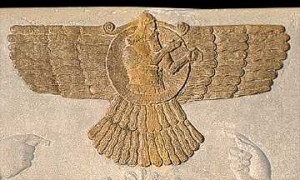 (Ashur protecting his king from his sky-disc above)
(Ashur protecting his king from his sky-disc above)
[1.22] a Prince who in the service of Assur and the Sun-god (Utu), the gods in whom he trusted, royally marched to turbulent lands, and Kings who had rebelled against him
[1.23] he cut off like grass, all their lands to his feet he subjected, restorer of the worship of the goddesses and that of the great gods,
[1.24] Chief unwavering, who for the guidance of the heads (and) elders of his land is a steadfast guardian, the work of whose hands and
[1.25] the gift of whose finger the great gods of heaven and earth have exalted, and his steps over rulers have they established forever;
[1.26] their power for the preservation of my Royalty have they exercised; the retribution of his power, (and) the approach of His Majesty over Princes
[1.27] of the four regions they have extended: the enemies of Assur in all their country, the upper and the lower I chastised, and tribute and impost
[1.28] upon them I established, capturing the enemies of Assur – mighty King, King of Assyria, son of Tuklat-Adar who all his enemies
[1.29] has scattered; (who) in the dust threw down the corpses of his enemies, the grandson of Bin-nirari, the servant of the great gods,
[1.30] who crucified alive and routed his enemies and subdued them to his yoke, descendant of Assur-dan-il, who the fortresses
[1.31] established (and) the fanes made good. In those days by the decree of the great gods to royalty power supremacy I rose up:
[1.32] I am a King, I am a Lord, I am glorious, I am great, I am mighty, I have arisen, I am Chief, I am a Prince, I am a warrior
[1.33] I am great and I am glorious, Assur-nasir-habal, a mighty King of Assyria, proclaimer of the Moon-god, worshipper of Anu (king & father of ruling sons on Earth), exalter of Yav (Adad), suppliant of the gods
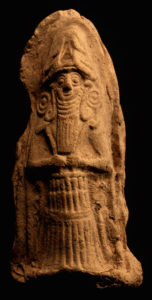
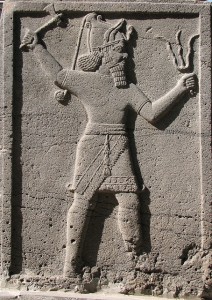 (Anunnaki King Anu; Adad the Thunder God)
(Anunnaki King Anu; Adad the Thunder God)
[1.34] am I, servant unyielding, subduing the land of his foeman, a King mighty in battle, destroyer of cities and forests,
[1.35] Chief over opponents, King of the four regions, expeller of his foes, prostrating all his enemies, Prince of a multitude of lands of all Kings
[1.36] Even of all, a Prince subduing those disobedient to him, who is ruling all the multitudes of men. These aspirations to the face of the great gods
[1.37] have gone up; on my destiny steadfastly have they determined; at the wishes of my heart and the uplifting of my hand, Istar (Inanna), exalted Lady,
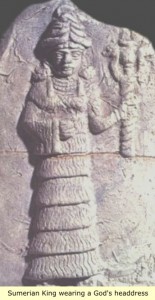 (Inanna holding alien lion-headed weapon, Goddess of War)
(Inanna holding alien lion-headed weapon, Goddess of War)
[1.38] hath favored me in my intentions, and to the conduct of (my) battles and warfare hath applied her heart. In those days I Assur-nasir-pal, glorious Prince, worshipper of the great gods
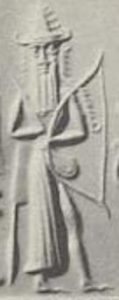
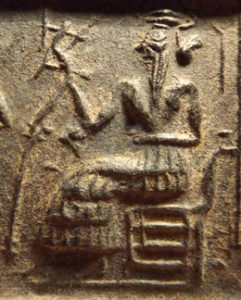 (Enlil, King Anu’s son & heir, appointed Earth Colony Commander)
(Enlil, King Anu’s son & heir, appointed Earth Colony Commander)
[1.39] the wishes of whose heart Bel will cause him to attain, and who has conquered all Kings who disobey him, and by his hand capturing
[1.40] his enemies, who in difficult places has beaten down assemblages of rebels; when Assur, mighty Lord, proclaimer of my name
[1.41] aggrandizer of my royalty over the Kings of the four regions, bountifully hath added his invincible power to the forces of my government,
[1.42] putting me in possession of lands, and mighty forests for exploration hath he given and urgently impelled me – by the might of Ashur my Lord,
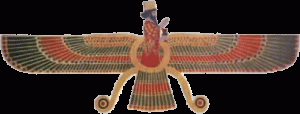 (Ashur in his winged sky-disc)
(Ashur in his winged sky-disc)
[1.43] perplexed paths, difficult mountains by the impetuosity of my hosts I traversed, and an equal there was not. In the beginning of my reign
[1.44] (and) in my first campaign when the Sun-god guider of the lands threw over me his beneficent protection on the throne of my dominion I firmly seated myself; a scepter
[1.45] the dread of man into my hands I took; my chariots (and) armies I collected; rugged paths, difficult mountains, which for the passage
[1.46] of chariots and armies was not suited I passed, and to the land of Nairi I went: Libie, their capital city, the cities Zurra and Abuqu
[1.47] Arura Arubie, situated within the limits of the land of Aruni and Etini, fortified cities, I took, their fighting-men
[1.48] in numbers I slew; their spoil, their wealth, their cattle I spoiled; their soldiers were discouraged; they took possession of a difficult mountain, a mountain exceedingly difficult; after them
[1.49] I did not proceed, for it was a mountain ascending up like lofty points of iron, and the beautiful birds of heaven had not reached up into it: like nests
[1.50] of the young birds in the midst of the mountain their defense they placed, into which none of the Kings my fathers had ever penetrated: in three days
[1.51] successfully on one large mountain, his courage vanquished opposition: along the feet of that mountain I crept and hid: their nests, their tents,
[1.52] I broke up; 200 of their warriors with weapons I destroyed; their spoil in abundance like the young of sheep I carried off;
[1.53] their corpses like rubbish on the mountains I heaped up; their relics in tangled hollows of the mountains I consumed; their cities
[1.54] I overthrew, I demolished, in fire I burned: from the land of Nummi to the land of Kirruri I came down; the tribute of Kirruri
[1.55] of the territory of Zimizi, Zimira, Ulmanya, Adavas, Kargai, Harmasai, horses, (fish (?).
[1.56] oxen, horned sheep in numbers, copper, as their tribute I received: an officer to guard boundaries over them I placed. While in the land of Kirruri
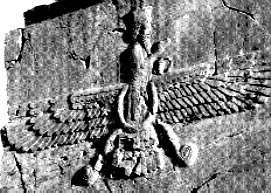 (ancient artifact of Ashur in his winged sky-disc)
(ancient artifact of Ashur in his winged sky-disc)
[1.57] they detained me, the fear of Assur my Lord overwhelmed the lands of Gilzanai and Khubuskai; horses, silver
[1.58] gold, tin, copper, kams of copper as their tribute they brought to me. From the land of Kirruri I withdrew;
[1.59] to a territory close by the town Khulun in Gilhi Bitani I passed: the cities of Khatu, Khalaru, Nistun, Irbidi,
[1.60] Mitkie, Arzanie, Zila, Khalue, cities of Gilhi situated in the environs of Uzie and Arue
[1.61] and Arardi powerful lands, I occupied: their soldiers in numbers I slew; their spoil, their riches I carried off;
[1.62] their soldiers were discouraged; the summits projecting over against the city of Nistun which were menacing like the storms of heaven, I captured;
[1.63] into which no one among the Princes my sires had ever penetrated; my soldiers like birds (of prey) rushed upon them;
[1.64] 260 of their warriors by the sword I smote down; their heads cut off in heaps I arranged; the rest of them like birds
[1.65] in a nest, in the rocks of the mountains nestled; their spoil, their riches from the midst of the mountains I brought down; cities which were in the midst
[1.66] of vast forests situated I overthrew, destroyed, burned in fire; the rebellious soldiers fled from before my arms; they came down; my yoke
[1.67] they received; impost tribute and a Viceroy I set over them. Bubu son of Bubua son of the Prefect of Nistun
[1.68] in the city of Arbela I flayed; his skin I stretched in contempt upon the wall. At that time an image of my person I made; a history of my supremacy
[1.69] upon it I wrote, and (on) a mountain of the land of Ikin(?) in the city of Assur-nasir-pal at the foot I erected (it). In my own eponym in the month of July and the 24th day
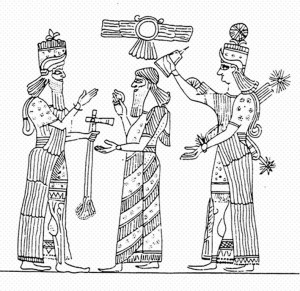 (Ashur, Assyrian mixed-breed king, & Inanna crowning him).
(Ashur, Assyrian mixed-breed king, & Inanna crowning him).
[1.70] in honor of Assur and Istar (Inanna) the great gods my Lords, I quitted the city of Nineveh: to cities situated below Nipur and Pazate powerful countries
1.71] I proceeded; Atkun, Nithu, Pilazi and 20 other cities in their environs I captured; many of their soldiers I slew;
[1.72] their spoil, their riches I carried off; the cities I burned with fire; the rebel soldiers fled from before my arms, submitted,
[1.73] and took my yoke; I left them in possession of their land. From the cities below Nipur and Pazate I withdrew; the Tigris I passed;
[1.74] to the land of Commagene I approached; the tribute of Commagene and of the Moschi in kams of copper, sheep and goats I received; while in Commagene
[1.75] I was stationed, they brought me intelligence that the city Suri in Bit-Khalupe had revolted. The people of Hamath had slain their governor
[1.76] Ahiyababa the son of Lamamana they brought from Bit-Adini and made him their King. By help of Assur and Yav (Adad)
[1.77] the great gods who aggrandize my royalty, chariots, (and) an army, I collected: the banks of the Chaboras I occupied; in my passage tribute
[1.78] in abundance from Salman-haman-ilin of the city of Sadikannai and of Il-yav of the city of Sunai, silver, gold,
[1.79] tin, kam of copper, vestments of wool, vestments of linen I received. To Suri which is in Bit-Halupe I drew near;
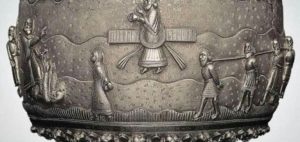 (alien god Ashur overwhelms his semi-divine king’s enemies)
(alien god Ashur overwhelms his semi-divine king’s enemies)
[1.80] the fear of the approach of Assur my Lord overwhelmed them; the great men and the multitudes of the city, for the saving of their lives, coming up after me,
[1.81] submitted to my yoke; some slain, some living, some tongue-less I made: Ahiyababa son of Lamamana
[1.82] whom from Bit-Adini they had fetched, I captured; in the valor of my heart and the steadfastness of my soldiers I besieged the city; the soldiers, rebels all,
[1.83] were taken prisoners; the nobles to the principal palace of his land I caused to send; his silver, his gold, his treasure, his riches, copper
[1.84] (?)tin, kams, tabhani, hariati of copper, choice copper in abundance, alabaster and iron-stone of large size
[1.85] the treasures of his harem, his daughters and the wives of the rebels with their treasures, and the gods with their treasures,
[1.86] precious stones of the land of . . . , his swift chariot, his horses, the harness, his chariot-yoke, trappings for horses, coverings for men,
[1.87] vestments of wool, vestments of linen, handsome altars of cedar, handsome . . . , bowls of cedar-wood
[1.88] beautiful black coverings, beautiful purple coverings, carpets, his oxen, his sheep, his abundant spoil, which like the stars of heaven could not be reckoned,
[1.89] I carried off; Aziel as my lieutenant over them I placed; a trophy along the length of the great gate I erected: the rebellious nobles
[1.90] who had revolted against me and whose skins I had stripped off, I made into a trophy: some in the middle of the pile I left to decay; some on the top
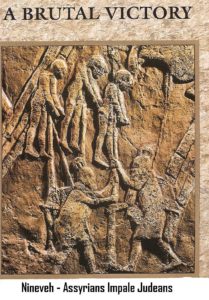 (losers of ancient wars)
(losers of ancient wars)
[1.91] of the pile on stakes I impaled; some by the side of the pile I placed in order on stakes; many within view of my land
[1.92] I flayed; their skins on the walls I arranged; of the officers of the King’s officer, rebels, the limbs I cut off;
[1.93] I brought Ahiyababa to Nineveh; I flayed, him and fastened his skin to the wall; laws and edicts
[1.94] over Lakie I established. While I was staying in Suri the tribute of the Princes of Lakie throughout the whole of them,
[1.95] silver, gold, tin, copper, kam of copper, oxen, sheep, vestments of wool and linen, as tribute
[1.96] and gift, I defined and imposed upon them. In those days, the tribute of Khayani of the city of Hindanai, silver,
[1.97] gold, tin, copper, amu-stone, alabaster blocks, beautiful black (and) lustrous coverings I received as tribute from him. In those days an enlarged image
[1.98] of my Royalty I made; edicts and decrees upon it I wrote; in the midst of his palace I put it up; of stone my tablets I made;
[1.99] the decrees of my throne upon it I wrote; in the great gate I fixed them, in the date of this year which takes its name from me, in honor of Assur my Lord and Ninip who uplifts my feet.
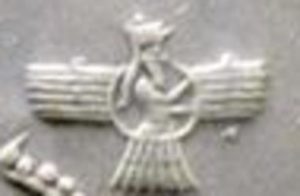
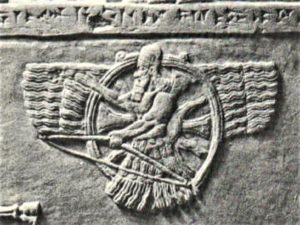 (Ninurta & Ashur, giant gods who uplifts semi-divine kings’ feet)
(Ninurta & Ashur, giant gods who uplifts semi-divine kings’ feet)
[1.100] Whereas in the times of the Kings my fathers no man of Suhi to Assyria had ever come, Il-bani Prince of Suhi together with his soldiers
[1.101] (and) his son, silver, gold as his tribute to Nineveh in abundance brought: in my own eponym at the city of Nineveh I stayed: news
[1.102] they brought me that men of the land of Assyria, (and) Hulai the governor of their city which Shalmaneser King of Assyria my predecessor
[1.103] to the city of Hasiluha had united, had revolted: Dandamusa a city of my dominion marched out to subdue (them );
[1.104] in honor of Assur, the Sun-god (Utu) and Yav, the gods in whom I trust, my chariots and army I collected at the head of the river Zupnat, the place of an image
[1.105] which Tiglath-Pileser and Tiglath-Adar, Kings of Assyria my fathers had raised; an image of My Majesty I constructed and put up with theirs.
[1.106] In those days I renewed the tribute of the land of Izala, oxen, sheep, goats: to the land of Kasyari I proceeded, and to Kinabu
[1.107] the fortified city of the province of Hulai. I drew near; with the impetuosity of my formidable attack I besieged and took the town; 600 of their fighting men
[1.108] with (my) arms I destroyed; 3,000 of their captives I consigned to the flames; as hostages I left not one of them alive; Hulai
[1.109] the governor of their town I captured by (my) hand alive; their corpses into piles I built; their boys and maidens I dishonored;
[1.110] Hulai the governor of their city I flayed: his skin on the walls of Damdamusa I placed in contempt; the city I overthrew demolished, burned with fire;
[1.111] the city of Mariru within their territory I took; 50 warrior fighting men by ( my ) weapons I destroyed; 200 of their captives in the flame I burned;
[1.112] the soldiers of the land of Nirbi I slew in fight in the desert; their spoil, their oxen, their sheep, I brought away; Nirbu which is at the foot of mount Ukhira
[1.113] I boldly took; I then passed over to Tila their fortified city; from Kinabu I withdrew; to Tila I drew near;
[1.114] a strong city with three forts facing each other: the soldiers to their strong forts and numerous army trusted and would not submit;
[1.115] my yoke they would not accept; (then,) with onset and attack I besieged the city; their fighting men with my weapons I destroyed; of their spoil,
[1.116] their riches, oxen and sheep, I made plunder; much booty I burned with fire; many soldiers I captured alive;
[1.117] of some I chopped off the hands and feet; of others the noses and ears I cut off; of many soldiers I destroyed the eyes;
[1.118] one pile of bodies while yet alive, and one of heads I reared up on the heights within their town; their heads in the midst I hoisted; their boys
Column 2
[2.1] and their maidens I dishonored, the city I overthrew, razed and burned with fire, In those days the cities of the land of Nirbi
[2.2] (and) their strong fortresses, I overthrew, demolished, burned with fire: from Nirbi I withdrew and to the city Tuskha
[2.3] I approached; the city of Tuskha I again occupied; its old fort I threw down: its place I prepared, its dimensions I took; a new castle
[2.4] from its foundation to its roof I built, I completed, I reared: a palace for the residence of My Royalty with doors of iki wood I made;
[2.5] a palace of brick from its foundations to its roof I made, I completed: a complete image of my person of polished stone I made; the history
[2.6] of my surpassing nation and an account of my conquests which in the country of Nairi I had accomplished I wrote upon it; in the city of Tuskha
[2.7] I raised it; on suitable stone I wrote and upon the wall I fixed it; (then) the men of Assyria, those who from the privation of food to various countries
[2.8] And to Rurie had gone up, to Tuskha I brought back and settled there: that city to myself
[2.9] I took; the wheats and barleys of Nirbi I accumulated in it; the populace of Nirbi who before my arms had fled,
[2.10] returned and accepted my yoke; of their towns, their Viceroys, their many convenient houses I took possession; impost and tribute, horses,
[2.11] horses for the yoke, fish, oxen, sheep, goats in addition to what I had before settled, I imposed upon them; their youths as hostages
[2.12] I took. While I was staying in Tuskha, I received the tribute of Ammibaal son of Zamani, of Anhiti of the land of Rurie
[2.13] of Labduri son of Dubuzi of the land of Nirdun and the tribute of the land of Urumi-sa Bitani, of the Princes of the land of Nairi,
[2.14] chariots, horses, horses for the yoke, tin, silver, gold, kam of copper, oxen, sheep, goats.
[2.15] Over the land of Nairi I established a viceroy: (but) on my return the land of Nairi, and Nirbu which is in
[2.16] the land of Kasyari, revolted; nine of their cities leagued themselves with Ispilipri one of their fortified towns and to a mountain difficult of access
[2.17] they trusted; but the heights of the hill I besieged and took; in the midst of the strong mountain their fighting men I slew; their corpses like rubbish on the hills
[2.18] I piled up; their common people in the tangled hollows of the mountains I consumed; their spoil, their property I carried off; the heads of their soldiers
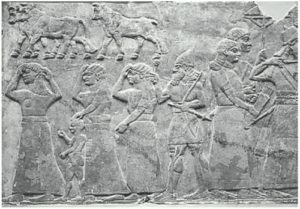 (brutal treatment of female captives)
(brutal treatment of female captives)
[2.19] I cut off; a pile (of them) in the highest part of the city I built; their boys and maidens I dishonored; to the environs of the city Buliyani
[2.20] I passed; the banks of the river Lukia I took possession of; in my passage I occupied the towns of the land of Kirhi hard by; many of their warriors
[2.21] I slew; their spoil I spoiled; their cities with fire I burned: to the city of Ardupati I went. In those days the tribute
[2.22] of Ahiramu son of Yahiru of the land of Nilaai son of Bahiani of the land of the Hittites and of the Princes of the land of Hanirabi, silver, gold,
[2.23] tin, kam of copper, oxen, sheep, horses, as their tribute I received; in the eponym of Assuridin they brought me intelligence that
[2.24] Zab-yav Prince of the land of Dagara had revolted. The land of Zamua throughout its whole extent he boldly seized; near the city of Babite
[2.25] they constructed a fort; for combat and battle they marched forth: in the service of Assur, the great god my Lord and the great Merodach (Marduk)
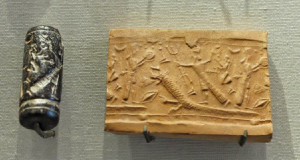 (Marduk atop Ningishzidda snake symbol, & Inanna)
(Marduk atop Ningishzidda snake symbol, & Inanna)
[2.26] going before me, by the powerful aid which the Lord Assur extended to my people, my servants and my soldiers I called together; to the vicinity
[2.27] of Babite I marched: the soldiers to the valor of their army trusted and gave battle: but in the mighty force of the great Merodach going before me (with alien technologies)
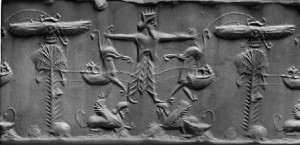 (Marduk & sky-discs)
(Marduk & sky-discs)
[2.28] I engaged in battle with them; I effected their overthrow; I broke them down; 1,460 of their warriors in the environs
[2.29] I slew; Uzie, Birata, and Lagalaga, their strong towns, with 100 towns within their territory I captured;
[2.30] their spoil, their youths, their oxen, and sheep I carried off; Zab-yav for the preservation of his life, a rugged mountain
[2.31] ascended; 1,200 of their soldiers I carried off; from the land of Dagara I withdrew; to the city of Bara I approached; the city of Bara
[2.32] I captured; 320 of their soldiers by my weapons I destroyed; their oxen, sheep, and spoil in abundance I removed;
[2.33] 300 of their soldiers I took off; on Tasritu 15th from the town Kalzi I withdrew, and came to the environs of Babite;
[2.34] from Babite I withdrew; to the land of Nizir which they call Lulu-Kinaba I drew near; the city Bunasi one of their fortified cities
[2.35] belonging to Musazina and 20 cities of their environs I captured; the soldiers were discouraged; they took possession of a mountain difficult of access; I, Assur-nasir-pal impetuously after them
[2.36] like birds swooped down; their corpses lay thick on the hills of Nizir; 326 of their warriors I smote down; his horses I exacted of him,
[2.37] their common people in the tangled hollows I consumed; seven cities in Nizir, which were of their duly appointed fortresses I captured; their soldiers
[2.38] I slew; their spoil, their riches, their oxen, their sheep I carried off; the cities themselves I burned; to these my tents I returned to halt;
[2.39] from those same tents I departed; to cities of the land of Nizir whose place no one had ever seen I marched; the city of Larbusa
[2.40] the fortified city of Kirtiara and 8 cities of their territory I captured; the soldiers lost heart and took to a steep mountain, a mountain (which) like sharp iron stakes
[2.41] rose high upward; as for his soldiers, I ascended after them; in the midst of the mountain I scattered their corpses; 172 of their men I slew; soldiers
[2.42] in numbers in the hollows of the mountain I hunted down; their spoil, their cattle, their sheep, I took away; their cities with fire
[2.43] I burned; their heads on the high places of the mountain I lifted up; their boys and maidens I dishonored; to the tents aforesaid I returned to halt;
[2.44] from those same tents I withdrew; 150 cities of the territory of Larbusai, Durlulumai, Bunisai and Barai I captured;
[2.45] their fighting men I slew; their spoil I spoiled; the city of Hasabtal I razed (and) burned with fire; 50 soldiers of Barai I slew in battle on the plain.
[2.46] In those days the Princes of the entire land of Zamua were overwhelmed by the dread of the advance of Assur my Lord and submitted to my yoke; horses, silver, gold,
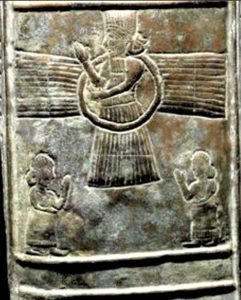 (god Ashur in his weaponized sky-disc)
(god Ashur in his weaponized sky-disc)
[2.47] I received; the entire land under a Prefect I placed; horses, silver, gold, wheat, barley, submission, I imposed upon them
[2.48] from the city of Tuklat-assur-azbat I withdrew; the land of Nispi accepted my yoke; I went down all night; to cities of remote site in the midst of Nispi
[2.49] which Zab-yav had established as his stronghold I went, took the city of Birutu and consigned it to the flames. In the eponym of Damiktiya-tuklat, when I was stationed at Nineveh, they brought me news
[2.50] that Amaka, and Arastua withheld the tribute and vassalage due to Assur my Lord. In honor of Assur mighty Lord and Merodach the great going before me,
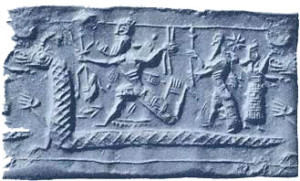 (Marduk wars against Inanna, etc.)
(Marduk wars against Inanna, etc.)
[2.51] on the first of May I prepared for the third time an expedition against Zamua: my fighting men before the many chariots I did not consider: from Kalzi I withdrew; the lower Zab
[2.52] I passed; to the vicinity of Babite I proceeded; the river Radanu at the foot of the mountains of Zima, my birthplace, I approached; oxen,
[2.53] sheep, goats, as the tribute of Dagara I received: near Zimaki I added my strong chariots and battering rams as chief of warlike implements to my magazines; by night
[2.54] and daybreak I went down; the Turnat in rafts I crossed; to Amali the strong city of Arastu I approached;
[2.55] with vigorous assault the city I besieged and took; 800 of their fighting men I destroyed by my weapons; I filled the streets of their city with their corpses;
[2.56] their many houses I burned; many soldiers I took alive; their spoil in abundance I carried off; the city I overthrew razed and burnt with fire; the city Khudun
[2.57] and 20 cities in its environs I took; their soldiers I slew; their booty in cattle and sheep I carried off; their cities I overthrew razed and burned; their boys
[2.58] their maidens I dishonored; the city of Kisirtu a fortified city of Zabini with 10 neighboring cities I took; their soldiers I slew; their spoil
[2.59] I carried off; the cities of Barai and Kirtiara, Bunisai together with the province of Khasmar I overthrew razed and burned with fire;
[2.60] I reduced the boundaries to a heap, and then from the cities of Arastua I withdrew: to the neighborhood of the territory of Laara and Bidirgi, rugged land, which for the passage
[2.61] of chariots and an arms was not adapted, I passed: to the royal city Zamri of Amika of Zamua I drew near; Amika from before the mighty prowess of my formidable attack
[2.62] fled in fear and took refuge on a hill difficult of access: I brought forth the treasures of his palace and his chariot; from Zamri I withdrew and passed the river Lallu and to the mountains of Etini,
[2.63] difficult ground, unfit for the passage of chariots and armies, whither none of the Princes my sires had ever penetrated; I marched in pursuit of his army on the mountains of Etini:
[2.64] the hill I ascended: his treasure, his riches, vessels of copper, abundance of copper, kam of copper, bowls of copper, pitchers of copper, the treasures of his palace and of his storehouses,
[2.65] from within the mountains I took away to my camp and made a halt: by the aid of Assur and the Sun-god (Utu), the gods in whom I trust, from that camp I withdrew and proceeded on my march;
[2.66] the river Edir I passed on the confines of Soua and Elaniu, powerful lands; their soldiers I slew in numbers; their treasure, their riches, am of copper,
[2.67] kam of copper, sapli and namziete of copper, vessels of copper in abundance, pasur wood, gold and ahzi, their oxen sheep, riches,
[2.68] his abundant spoil, from below the mountains of Elani, his horses, I exacted from him: Amika for the saving of his life to the land of Sabue went up
[2.69] the cities Zamru, Arazitku, Amaru. Parsindu, Eritu, Zuritu his fortified city, with 150 cities
[2.70] of his territory I overthrew, razed, burned; the boundary I reduced to a heap. While in the vicinity of Parsindi I was stationed, the war-like engines of the tribe of Kallabu
[2.71] came forth against the place; 150 of the fighting men of Amika I slew in the plain; their heads I cut off and put them up on the heights of his palace;
[2.72] 200 of his soldiers taken by (my) hands alive I left to rot on the wall of his palace: from Zamri the battering-rams and . . . my banners I made ready;
[2.73] to the fortress Ata, of Arzizai, whither none of the Kings my sires had ever penetrated I marched; the cities of Arzizu, and Arzindu
[2.74] his fortified city, with ten cities situated in their environs in the midst of Nispi a rugged country, I captured; their soldiers I slew the cities I overthrew razed and burned with fire:
[2.75] to those my tents I returned. In those days I received copper, tabbili of copper, kanmate of copper, and sariete as the tribute of the land of Siparmina, such as women
[2.76] collect: from the city of Zamri I withdrew; to Lara, (the rugged hill-country, unfitted for the passage of chariots and armies, with instruments [axes] of iron I cut through and
[2.77] with rollers of metal I beat down) with the chariots and troops I brought over to the city of Tiglath-assur-azbat in the land of Lulu – the city of Arakdi they call it – I went down;
[2.78] the Kings of Zamue, the whole of them, from before the impetuosity of my servants and the greatness of my power drew back and accepted my yoke; tribute of silver, gold, tin,
[2.79] copper, kam of copper, vestments of wool, horses, oxen, sheep, goats, in addition to what I had before settled, I imposed upon them; a Viceroy
[2.80] in Kalach I created. While in the land of Zamue I was stationed the cities Khudunai, Khartisai, Khutiskai Kirzanai
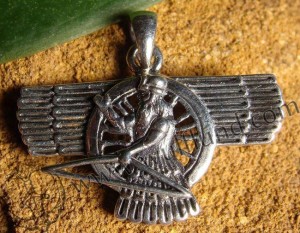 (armed warrior god Ashur in his winged sky-disc)
(armed warrior god Ashur in his winged sky-disc)
[2.81] were overwhelmed by fear of the advance of Assur my Lord; impost, tribute, silver, gold, horses, vestments of wool, oxen, sheep, goats, they brought to me; the rebel soldiers
[2.82] fled from before my arms; they fled to the mountains; I marched after them; within confines of the land of Aziru they settled and got ready the city of Mizu as their strong place;
[2.83] the land of Aziru I overthrew and destroyed from Zimaki as far as the Turnat I scattered their corpses; 500 of their fighting men I destroyed;
[2.84] their spoil in abundance I carried off. In those days in the land of Samua, (in which is) the city of Atlila which Zibir King of Kardunias had taken, devastated,
[2.85] and reduced to a heap of ruins, I Assur-nasir-pal King of Assyria took, after laying siege to its castle a second time the palace as a residence for My Majesty I therein strengthened, made princely and enlarged beyond what of old was planned;
[2.86] the wheat and barleys of the land of Kalibi I accumulated therein; I gave it the name of Dur-Assur. On the first of May in the eponym of Sanmapakid I collected my chariots and soldiers
[2.87] the Tigris I crossed; to the land of Commagene I passed on; I inaugurated a palace in the city of Tiluli; the tribute due from Commagene I received; from Commagene I withdrew;
[2.88] I passed on to the land of the Istarat; in the city of Kibaki I halted; from Kibaki I received oxen, sheep, goats and copper; from Kibaki I withdrew;
[2.89] to the city of Mattyati I drew nigh; I took possession of the land of Yatu with the town Kapranisa; 2,800 of their fighting men I smote down with my weapons; their spoil in abundance I carried off;
[2.90] the rebels who had fled from before my arms now accepted my yoke; of their cities I left them in possession; tribute impost and an officer over them I set;
[2.91] an image of my person I made; collected laws I wrote upon it and in the city of Mattiyati I placed it; from Mattiyati I withdrew; at the city of Zazabuka
[2.92] I halted; the tribute of Calach in oxen, sheep, goats and various copper articles I received; from Zazabuka I withdrew;
[2.93] at the city of Irzia I made a halt; that city I burned; but received there the tributes due from Zura in oxen, sheep, goats and kam copper:
[2.94] from Izria I withdrew; in the land of Kasyari I halted; Madara (and) Anzi two cities of the territory I captured and slew their soldiers;
[2.95] their spoil I carried off; the cities I burned with fire; six lakes I crossed over in Kasyari, a rugged highland for the passage of chariots and an army
[2.96] unsuited; (the hills with instruments of iron I cut through [and] with rollers of metal I beat down;) the chariots and army I brought over. In a city of Assur on the sandy side which is in Kasyari,
[2.97] oxen, sheep, goats kam and gurpisi of copper I received; by the land of Kasyari I proceeded; a second time to the land of Nairi I went down; at the city of Sigisa
[2.98] I made a halt; from Sigisa I withdrew; to Madara the fortified city of Labduri the son of Dubisi I drew near, a city extremely strong with four impregnable castles;
[2.99] the city I besieged; they quailed before my mighty prowess; I received, for the preservation of their lives, their treasures, their riches, their sons, by tale; I imposed upon them
[2.100] tribute and duties; an officer I appointed over them; the city I demolished, razed, and reduced to a heap of ruins; from Madara I withdrew; to Tuskha
[2.101] I passed over; a palace in Tuskha I dedicated; the tribute of the land of Nirdun, horses, yoke-horses, fish, kam of copper, gurpisi of copper, oxen, sheep,
[2.102] goats, in Tuskha I received; 60 cities and strong castles below Kasyari, belonging to Labduri son of Dubuzi I overthrew razed and converted to a heap of ruins.
[2.103] In the service of Assur my Lord from Tuskha I withdrew. The powerful chariots and battering-rams I put up in my stores; on rafts
[2.104] I passed the Tigris; all night I descended; to Pitura a strong town of Dirrai I drew near – a very strong city –
[2.105] two forts facing each other, whose castle like the summit of a mountain stood up: by the mighty hands of Assur my Lord and the impetuosity of my army and my formidable attack
[2.106] I gave them battle; on two days before sunrise like Yav (Adad) the inundator I rushed upon them; destruction upon them I rained with the might
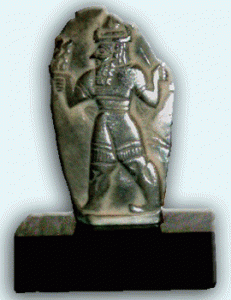 (Yav / Adad The Inundator, God of Storms)
(Yav / Adad The Inundator, God of Storms)
[2.107] and prowess of my warriors; like the rush of birds coming upon them, the city I captured; 800 of their soldiers by my arms I destroyed; their heads
[2.108] I cut off; many soldiers I captured in hand alive; their populace in the flames I burned; their spoil I carried off in abundance; a trophy of the living and of heads
[2.109] about his great gate I built; 700 soldiers I there impaled on stakes; the city I overthrew, razed, and reduced to a heap of ruins all round; their boys,
[2.110] their maidens, I dishonored; the city of Kukunu facing the mountains of Matni I captured; 700 of their fighting men I smote down with my weapons;
[2.111] their spoil in abundance I carried off; 50 cities of Dira I occupied; their soldiers I slew; I plundered them; 50 soldiers I took alive; the cities I overthrew
[2.112] razed and burned; the approach of my Royalty overcame them; from Pitura I withdrew, and went down to Arbaki in Gilhi-Bitani;
[2.113] they quailed before the approach of my Majesty, and deserted their towns and strong places: for the saving of their lives they went up to Matni a land of strength
[2.114] I went after them in pursuit; 1,000 of their warriors I left in the rugged hills; their corpses on a hill I piled up; with their bodies the tangled hollows
[2.115] of the mountains I filled; I captured 200 soldiers and cut off their hands; their spoil I carried away; their oxen, their sheep
[2.116] without number, I took away; Iyaya, Salaniba, strong cities of Arbaki I occupied; the soldiers I slew; their spoil I carried off
[2.117] 250 towns surrounded with strong walls in the land of Nairi I overthrew demolished and reduced to heaps and ruins; the trees of their land I cut down; the wheat
[2.118] and barley in Tuskha I kept. Ammiba’al the son of Zamani had been betrayed and slain by his nobles. To revenge Ammiba’al
[2.119] I marched; from before the vehemence of my arms and the greatness of my Royalty
[2.120] they drew back: his swift chariots, trappings for men and horses one hundred in number,
[2.121] horses, harness, his yokes, tribute of silver and gold with 100 talents
[2.122] in tin, 100 talents in copper, 300 talents in annui, 100 kam of copper, 3,000 kappi of copper, bowls of copper, vessels of copper,
[2.123] 1,000 vestments of wool, nui wood, eru wood, zalmalli wood, horns, choice gold,
[2.124] the treasures of his palace, 2,000 oxen, 5,000 sheep, his wife, with large donations from her; the daughters
[2.125] of his chiefs with large donations from them I received. I, Assur-nasir-pal, great King, mighty King, King of legions, King of Assyria,
[2.126] son of Tuklat-Adar great and mighty King, King of legions, King of Assyria, noble warrior, in the strength of Assur his Lord walked, and whose equal among the Kings
[2.127] of the four regions exists not; a King who from beyond the Tigris up to Lebanon and the Great Sea
[2.128] hath subjugated the land of Laki in its entirety, the land of Zuhi with the city of Ripaki: from the sources of the Ani
[2.129] (and) the Zupnat to the land bordering on Sabitan has he held in hand: the territory of Kirrouri with Kilzani on the other side the Lower Zab
[2.130] to Tul-Bari which is beyond the country of the Zab; beyond the city of Tul-sa-Zabdani, Hirimu, Harute, the land of Birate
[2.131] and of Kardunias I annexed to the borders of my realm and on the broad territory of Nairi I laid fresh tribute. The city of Calach I took anew; the old mound
[2.132] I threw down; to the top of the water I brought it; 120 hand-breadths in depth I made it good; a temple to Ninip my Lord I therein founded; when
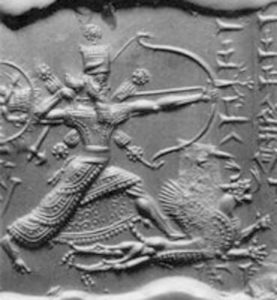
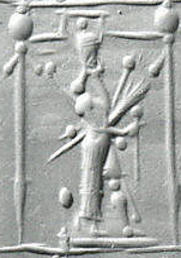 (Ninurta, warrior son & heir to Enlil & King Anu)
(Ninurta, warrior son & heir to Enlil & King Anu)
[2.133] an image of Ninip (Ninurta) himself which had not been made before, in the reverence of my heart for his great mighty god-ship, of mountain stone and brilliant gold I caused to make in its completeness;
[2.134] for my great divinity in the city of Calach I accounted him: his festivals in the months of January and September I established: Bit-kursi which was unoccupied I closed:
[2.135] an altar to Ninip (Ninurta) my Lord I therein consecrated: a temple for Beltis (Inanna), Sin (Nannar), and Gulanu (Bau / Gula), Hea-Manna (Enki) and Yav (Adad) great ruler of heaven and earth I founded.
Column 3
[3.1] On the 22d day of the third month, May, in the eponym of Dagan-bel-ussur, I withdrew from Calach; I passed the Tigris at its nearer bank
[3.2] and received a large tribute; at Tabite I made a halt; on the 6th day of the fourth month, June, I withdrew from Tabite and skirted the banks of Kharmis;
[3.3] at the town of Magarizi I made a halt; withdrew from it and passed along by the banks of the Chaboras and halted at Sadikanni;
[3.4] the tribute due from Sadikanni, silver, gold, tin, kam of copper, oxen, sheep, I received and quitted the place.
[3.5] At the city of Katni I made a halt; the tribute of Sunaya I received, and from Katni withdrew;
[3.6] at Dar-Kumlimi I halted; withdrew from it and halted at Bit-Halupe, whose tribute
[3.7] of silver, gold, tin, kam of copper, vestments of wool and linen, oxen and sheep I received, and withdrew from it;
[3.8] at the city of Zirki I made a halt; the tribute of Zirki, silver, gold, tin, oxen,
[3.9] sheep, I received; withdrew from Zirki; halted at Zupri, whose tribute
[3.10] of silver, gold, tin, kami, oxen, sheep, I received; withdrew from Zupri and halted at Nagarabani,
[3.11] whose tribute in silver, gold, tin, kami, oxen, sheep, I received and withdrew from it;
[3.12] near Khindani, situated on the nearer banks of the Euphrates I halted;
[3.13] the tribute of Khindani, silver, gold, tin, kami, oxen, sheep, I received. From Khindani
[3.14] I withdrew; at the mountains over against the Euphrates I halted; I withdrew from those mountains and halted at Bit-Sabaya near the town of Haridi
[3.15] situate on the nearer bank of the Euphrates. From Bit-Sabaya I withdrew; at the commencement of the town of Anat
[3.16] I made a halt. Anat is situated in the midst of the Euphrates. From Anat I withdrew. The city of Zuru the fortified city of
[3.17] Sadudu of the land of Zuhi I besieged: to the numerous warriors of the spacious land of the Kassi he trusted and to make war and battle to my presence advanced;
[3.18] the city I besieged; two days I was engaged in fighting; I made good an entrance: (then) through fear of my mighty arms Sadudu and his soldiers
[3.19] for the preservation of his life, into the Euphrates threw himself: I took the city; 50 bit-hallu and their soldiers in the service of Nabu-bal-idin King of Kardunias;
[3.20] Zabdanu his brother with 300 of his soldiers and Bel-bal-idin who marched at the head of their armies I captured, together with them
[3.21] many soldiers I smote down with my weapons; silver, gold, tin, precious stone of the mountains, the treasure of his palace,
[3.22] chariots, horses trained to the yoke, trappings for men and horses, the women of his palace, his spoil,
[3.23] in abundance I carried off; the city I pulled down and razed; ordinances and edicts I imposed on Zuhi; the fear of my dominion to Kardunias reached;
[3.24] the greatness of my arms overwhelmed Chaldaea; on the countries of the banks of the Euphrates my impetuous soldiers I sent forth; an image
[3.25] of my person I made; decrees and edicts upon it I inscribed; in Zuri I put it up, I Assur-nasir-pal, a King who has enforced his laws
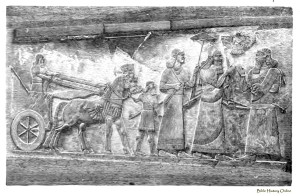 (Ashurnatsirpal II protected by Ashur above)
(Ashurnatsirpal II protected by Ashur above)
[3.26] (and) decrees and who to the sword hath directed his face to conquests and alliances hath raised his heart. While I was stationed at Calach
[3.27] they brought me news that the population of Laqai and Khindanu of the whole land of Zukhi had revolted and crossed the Euphrates
[3.28] on the eighteenth of May I withdrew from Calach, passed the Tigris, took the desert to Zuri:
[3.29] by Bit-Halupi I approached in ships belonging to me which I had taken at Zuri: I took my way to the sources of the Euphrates;
[3.30] the narrows of the Euphrates I descended, the cities of Khintiel and Aziel in the land of Laqai I took; their soldier I slew; their spoil
[3.31] I carried off; the cities I overthrew, razed, burned with fire. In my expedition marching westward of the banks of the Chaboras to
[3.32] the city Zibate of Zuhi, cities on the other side of the Euphrates in the land of Laqai I overthrew, devastated an burned with fire; their crops I seized 460 soldiers
[3.33] their fighting men by (my) weapons I destroyed; I took 20 alive and impaled them on stakes; on ships which I had built –
[3.34] in 20 ships which were drawn up on the sand at Haridi I crossed the Euphrates. The land of Zuhaya and Laqai
[3.35] and the city of Khindanai to the power of their chariots armies and hands trusted and summoned 6,000 of their soldiers to engage in fight and battle.
[3.36] They came to close quarters; I fought with them; I effected their overthrow; I destroyed their chariots 6,500 of their warriors I smote down by my weapons; the remainder
[3.37] in starvation in the desert of the Euphrates I shut up. From Haridi in Zukhi to Kipina and the cities of Khindanai
[3.38] in Laqai on the other side I occupied; their fighting men I slew; the city I overthrew razed and burned. Aziel of Laqai
[3.39] trusted to his forces and took possession of the heights of Kipina; I gave them battle; at the city of Kipina I effected his overthrow; 1,000 of his warriors I slew;
[3.40] his chariots I destroyed; spoil I carried off in plenty; their gods I took away; for the preservation of his life he took refuge on a rugged hill of Bizuru at the sources of the Euphrates;
[3.41] for two days I descended the river in pursuit: the relic of his army with my weapons I destroyed; their hiding place by the hills on the Euphrates I broke up;
[3.42] to the cities of Dumite and Azrnu belonging to the son of Adini I went down after him; his spoil, his oxen, his sheep,
[3.43] which like the stars of heaven were without number I carried off. In those days Ila of Laqai, his swift chariots and 500 soldiers
[3.44] to my land of Assyria I transported; Dumutu and Azmu I captured, overthrew, razed and burned; in the narrows of the Euphrates I turned aside in my course and
[3.45] I outflanked Aziel, who fled before my mighty power to save his life. Ila, the Prince of Laqai, his army his chariots his harness,
[3.46] I carried off and took to my city of Assur: Khimtiel of Laqai I made prisoner in his own city. Through the might of Assur my Lord, (and) in the presence of my mighty arms (alien technologies) and the formidable attack
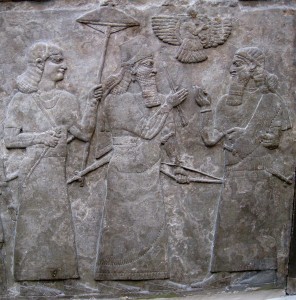 (Ashur protecting King Ashurnatsirpal II positioned from his sky-disc)
(Ashur protecting King Ashurnatsirpal II positioned from his sky-disc)
[3.47] of my powerful forces he was afraid, and I received the treasures of his palaces, silver, gold, tin, copper, kam of copper, vestments of wool, his abundant spoil; and tribute
[3.48] and impost in addition to what I had previously fixed I laid upon them; in those days I slew 50 buffaloes in the neighborhood of the nearer side of the Euphrates: eight buffaloes I caught alive;
[3.49] I killed 20 eagles, and captured others alive: I founded two cities on the Euphrates; one on the farther bank
[3.50] of the Euphrates which I named Dur-Assur-nasir-pal; one on the nearer bank which I named Nibarti-Assur. On the 20th of May I withdrew from Galach;
[3.51] I crossed the Tigris; to the land of Bit-Adini I went; to their strong city of Katrabi I approached, a city exceedingly strong, like a storm rushing from heaven,
[3.52] the soldiers confided to their numerous troops, and would not submit and accept my yoke: in honor of Assur the great Lord, my Lord, and the god the great protector going before me, I besieged the city
[3.53] by the warlike engines on foot and strong, the city I captured; many of their soldiers I slew; 800 of their fighting men I dispersed; their spoil and property I carried off, 2,400 of their warriors
[3.54] I transported away and detained them at Calach; the city I overthrew razed and burnt; the fear of the approach of Assur my Lord over Bit-Adini I made good.
[3.55] In those days the tribute of Ahuni son of Adini of Habini, of the city of Tul-Abnai, silver, gold, tin, copper, vestments of wool and linen, wood for bridges,
[3.56] cedar wood, the treasures of his palace I received; their hostages I took, rimutu I imposed upon them. In the month April and on the eighth day I quitted Calach; the Tigris
[3.57] I passed; to Carchemish in Syria I directed my steps; to Bit-Bakhiani I approached; the tribute due from the son of Bakhiani, swift chariots, horses, silver,
[3.58] gold, tin, copper, kami of copper, I received; the chariots and warlike engines of the officer of the son of Bakhiani I added to my magazines;
[3.59] I menaced the land of Anili: the tribute of Hu-immi of Nilaya, swift war chariots, horses, silver, gold, tin, copper,
[3.60] kami of copper, oxen, sheep, horses, I received; the chariots and warlike instruments of the officer I added to my magazines. From Anili I withdrew; to Bit-Adini I approached;
[3.61] the tribute of Ahuni son of Adini, silver, gold, tin, copper, wood of ereru, and rabaz, horns, sai-wood, horns
[3.62] of thrones horns of silver, and gold, sari, bracelets of gold, sahri fastenings for covers of gold, scabbards of gold, oxen, sheep, goats as his tribute I received;
[3.63] the chariots and warlike engines of the officer of Ahuni I added to my magazines. In those days I received the tribute of Habini of Tul-Abnai, four maneh of silver and 400 sheep;
[3.64] ten maneh of silver for his first year as tribute I imposed upon him: from Bit-Adini I withdrew; the Euphrates, in a difficult part of it, I crossed in ships of hardened skins:
[3.65] I approached the land of Carchemish: the tribute of Sangara King of Syria, twenty talents of silver, sahri gold, bracelets of gold, scabbards of gold, 100 talents
[3.66] of copper, 250 talents of annui kami, hariate, nirmakate kibil of copper, the extensive furniture of his palace,
[3.67] of incomprehensible perfection different kinds of woods, ka and sara, 200 female slaves, vestments of wool,
[3.68] and linen; beautiful black coverings, beautiful purple coverings, precious stones, horns of buffaloes, white chariots, images of gold, their coverings, the treasures of his Royalty, I received of him;
[3.69] the chariots and warlike engines of the General of Carchemish I laid up in my magazines; the Kings of all those lands who had come out against me received my yoke; their hostages I received;
[3.70] they did homage in my presence; to the land of Lebanon I proceeded. From Carchemish I withdrew and marched to the territory of Munzigani and Harmurga:
[3.71] the land of Ahanu I reduced; to Gaza the town of Lubarna of the Khatti I advanced; gold and vestments of linen I received:
[3.72] crossing the river Abrie I halted and then leaving that river approached the town of Kanulua a royal city belonging to Lubarna of the Khatti:
[3.73] from before my mighty arms and my formidable onset he fled in fear, and for the saving of his life submitted to my yoke; twenty talents of silver, one talent of gold,
[3.74] l00 talents in tin, 100 talents in annui, 1,000 oxen, 10,000 sheep, 1,000 vestments of wool, linen, nimati and ki woods coverings,
[3.75] ahusate thrones, kui wood, wood for seats, their coverings, sarai, zueri-wood, horns of kui in abundance, the numerous utensils of his palace, whose beauty
[3.76] could not be comprehended: . . . pagatu(?) from the wealth of great Lords as his tribute
[3.77] I imposed upon him; the chariots and warlike engines of the land of the Khatti I laid up in my magazines; their hostages I took. In those days (I received) the tribute of Guzi
[3.78] of the land of Yahanai, silver, gold, tin, . . . oxen, sheep, vestments of wool and linen I received: from Kuna1ua the capital of Lubarna I withdrew,
[3.79] of the land of the Khatti, crossed the Orontes, and after a halt left it, and to the borders
[3.80] of the land of Yaraki and of Yahturi I went round: the land . . . had rebelled: from the Sangura after a halt I withdrew;
[3.81] I made a detour to the lands of Saratini and Girpani . . . I halted and advanced to Aribue a fortified city belonging to Lubarna of the land of the Khatti:
[3.82] the city I took to myself; the wheats and barleys of Luhuti I collected; I allowed his palace to be sacked and settled Assyrians there.
[3.83] While I was stationed at Aribua, I captured the cities of the land of Luhiti and slew many of their soldiers; overthrew razed and burned them with fire;
[3.84] the soldiers whom I took alive I impaled on stakes close by their cities. In those days I occupied the environs of Lebanon; to the great sea
[3.85] of Phoenicia I went up: up to the great sea my arms I carried: to the gods I sacrificed; I took tribute of the Princes of the environs of the sea-coast,
[3.86] of the lands of Tyre, Sidon, Gebal, Maacah Maizai Kaizai, of Phoenicia and Arvad
[3.87] on the sea-coast – silver, gold, tin, copper, kam of copper, vestments of wool and linen, pagutu great and small,
[3.88] strong timber, wood of ki teeth of dolphins, the produce of the sea, I received as their tribute: my yoke they accepted; the mountains of Amanus I ascended; wood for bridges,
[3.89] pines, box, cypress, li-wood, I cut down; I offered sacrifices for my gods; a trophy of victory I made, and in a central place I erected it;
[3.90] gusuri-wood, cedar wood from Amanus I destined for Bit-Hira, and my pleasure house called Azmaku, for the temple of the Moon and Sun the exalted gods.
[3.91] I proceeded to the land of Iz-mehri, and took possession of it throughout: I cut down beams for bridges of mehri trees, and carried them to Nineveh; (and)
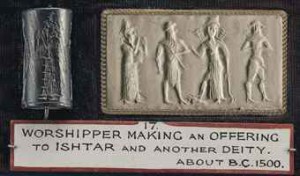 (Ninsun, her son-king Gilgamesh, Inanna, & Enkidu)
(Ninsun, her son-king Gilgamesh, Inanna, & Enkidu)
[3.92] to Istar Lady of Nineveh (on) my knees I knelt. In the eponym of Samas-nuri in the honor of the great Lord Assur my Lord on the 20th of April
[3.93] from Calach I withdrew – crossed the Tigris – descended to the land of Kipani, and there, in the city of Huzirina, received the tribute of the governors of its cities.
[3.94] While stationed at Huzirana I received the tribute of Ittiel of Nilaya, Giridadi of Assaya, in silver
[3.95] gold, oxen, sheep. In those days I received the tribute in beams for bridges, cedar wood, silver, gold of Qatuzili
[3.96] of Commagene – withdrew from Huzirina and took my way upward along the banks of the Euphrates; to Kubbu.
[3.97] I crossed over into the midst of the towns of Assa in Kirkhi over against Syria. The cities of Umalie and Khiranu
[3.98] powerful cities centrally situated in Adani I captured; numbers of their soldiers I slew; spoil beyond reckoning
[3.99] I carried off; the towns I overthrew and demolished; 150 cities of their territory I burned with fire; then from Khiranu
[3.100] I withdrew; I passed over to the environs of the land of Amadani; I went down among the cities of Dirrie, and the cities within the lands of
[3.101] Amadani and Arquanie I burned with fire: Mallanu which is in the middle of Arquanie I took as my own possession; I withdrew from Mallanu
[3.102] to the cities of Zamba on the sandy outskirt, which I burned with fire: I passed the river Sua, proceeding up to the Tigris whose cities
[3.103] on those banks and on these banks of the Tigris in Arkanie to a heap I reduced: its waters overflowed all Kirkhi: my yoke they took;
[3.104] their hostages I exacted; a Viceroy of my own I appointed over them: in the environs of the land of Amadani I arrived: at Barza-Nistun
[3.105] To Dandamusa the fortified city of Ilani son of Zamani I drew near and laid siege to it: my warriors like birds of prey rushed upon them;
[3.106] 600 of their warriors I put to the sword and decapitated; 400 I took alive;
[3.107] 3,000 captives I brought forth; I took possession of the city for myself: the living soldiers, and heads to the city of Amidi the royal city, I sent;
[3.108] heaps of the heads close by his great gate I piled; the living soldiers I crucified on crosses at the gates of the town;
[3.109] inside the gates I made carnage; their forests I cut down ; from Amidi I withdrew toward the environs of Kasyari; the city of Allabzie
[3.110] to whose rocks and stones no one among the Kings my fathers had ever made approach, I penetrated; to the town of Uda the fortress of Labduri son of Dubuzi
[3.111] I approached and besieged the city with bilsi(?) strengthened and marching; the city I captured: . . . soldiers . . . with my weapons I destroyed; 570 soldiers
[3.112] I captured; 3,000 captives I took forth; soldiers alive I caught; some I impaled on stakes; of others
[3.113] the eyes I put out: the remainder I carried off to Assur and took the city as my own possession – I who am Assur-nasir-pal mighty King, King of Assyria son of Tuklat-Adar, (Tuklat-Ninip)
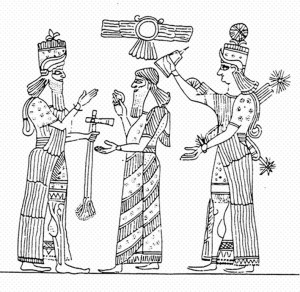 (Ashur, mixed-breed Assyrian king Ashurnatsirpal II, & Inanna crowning him)
(Ashur, mixed-breed Assyrian king Ashurnatsirpal II, & Inanna crowning him)
[3.114] great King, powerful King, King of legions, King of Assyria son of Vul-nirari great King, mighty King, King of legions, King of Assyria, noble warrior, who in the service of Assur his Lord proceeded, and among the Kings of the four regions,
[3.115] has no equa1, a Prince (giving) ordinances, not fearing opponents, mighty unrivaled leader, a Prince subduer of the disobedient, who all
[3.116] the thrones of mankind has subdued; powerful King treading over the heads of his enemies, trampling on the lands of enemies, breaking down the assemblages of the wicked; who in the service of the great gods
[3.117] his Lords marched along; whose hand hath taken possession of all their lands, laid low the forests of all of them, and received their tributes, taking hostages (and) imposing laws
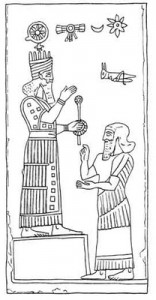
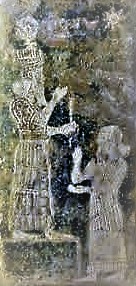 (giant alien god Ashur & his king Ashurnatsirpal II, named after him at birth)
(giant alien god Ashur & his king Ashurnatsirpal II, named after him at birth)
[3.118] upon all those lands; when Assur the Lord proclaimer of my name, aggrandizer of my Royalty, who added his unequivocal service to the forces of my government
[3.119] I destroyed the armies of the spacious land of Lulumi. In battle by weapons I smote them down. With the help of the Sun-god
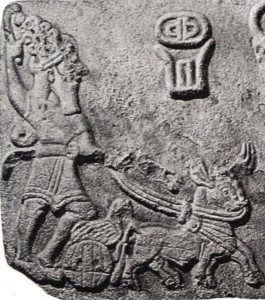 (Yav / Adad The Inundator, destroyer of earthling men)
(Yav / Adad The Inundator, destroyer of earthling men)
[3.120] and Yav, the gods in whom I trust, I rushed upon the armies of Nairi, Kirkhi Subariya and Nirbi like Yav the inundator;
[3.121] a King who from the other side the Tigris to the land of Lebanon and the great sea has subjugated to his yoke the entire land of Lakie and the land of Zukhi as far as the city Rapik;
[3.122] to whose yoke is subjected (all) from the sources of the Zupnat to the frontiers of Bitani; from the borders of Kirruri to Kirzani;
[3.123] from beyond the Lower Zab to the town of Tul-sa-Zabdani and the town of Tul-Bari beyond the land of Zaban as far as the towns of Tul-sa-Zabdani and
[3.124] Tul-sa-Abtani; Harimu, Harutu in Birate of Kardunias to the borders of my land I added; (the inhabitants) of the territory of Babite
[3.125] with Khasmar among the people of my own country I accounted: in the countries which I held I established a deputy: they performed homage: submission
[3.126] I imposed upon them; I, Assur-nasir-pal, great, noble, worshipper of the great gods, generous, great, mighty possessors of cities and the forests of all their domains, King of Lords, consumer of
[3.127] the wicked taskaru invincible, who combats injustice, Lord of all Kings, King of Kings, glorious, upholder of Bar (Ninip) the warlike, worshipper
[3.128] of the great gods, a King who, in the service of Assur and Ninip, gods in whom he trusted, hath marched royally, and wavering lands and Kings his enemies in all their lands
[3.129] to his yoke hath subdued, and the rebels against Assur, high and low, hath opposed and imposed on them impost and tribute – Assur-nasir-pal
[3.130] mighty King, glory of the Moon-god worshipper of Anu, related to Yav (Adad), suppliant of the gods, an unyielding servant, destroyer of the land of his foes; I, a King vehement in war,
[3.131] destroyer of forests and cities, chief over opponents, Lord of four regions, router of his enemies in strong lands and forests, and who Kings mighty and fearless from the rising
[3.132] to the setting of the sun to my yoke subjugated. The former city of Calach which Shalmaneser King of Assyria going before me, had built –
[3.133] that city was decayed and reduced to a heap of ruins: that city I built anew; the people captured by my hand of the countries which I had subdued, Zukhi and Lakie,
[3.134] throughout their entirety, the town of Sirku on the other side of the Euphrates, all Zamua, Bit-Adini, the Khatti, and the subjects of Liburna I collected within, I made them occupy.
[3.135] A water-course from the Upper Zab I dug and called it Pati-kanik: timber upon its shores I erected: a choice of animals to Assur my Lord and (for) the Chiefs of my realm I sacrificed;
[3.136] the ancient mound I threw down: to the level of the water I brought it: 120 courses on the low level I caused it to go: its wall I built; from the ground to the summit I built (and) completed.
[Additional clauses are found on the monolith inscription in the British Museum. They are not, however, of any great importance and amount to little more than directions for the preservation and reparation of the palace, with imprecations upon those who should at any time injure the buildings. On this same monolith is found an invocation to the great gods of the Assyrian Pantheon: namely, to Assur (Osiris), Anu, Hea (Enki), Sin (Nannar) [the Moon], Merodach (Marduk), Yav (Adad) Jahve, Jah[?] (Yahweh?), Ninip (Ninurta), Nebo (Nabu), Beltis (Ninlil), Nergal, Bel-Dagon (Enlil), Samas (Utu) [the Sun], Istar (Inanna).]
End of Translation
Note: The comment above is the translator’s published remarks, not mine. Unfortunately, I can only provide what was published. BJB
Copyright (c) 1996 by Bruce J. Butterfield
No restrictions are intended for non-profit use



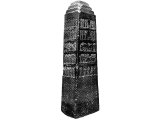

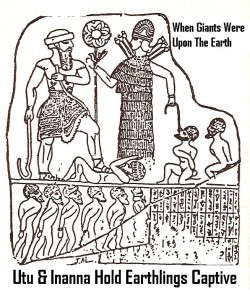
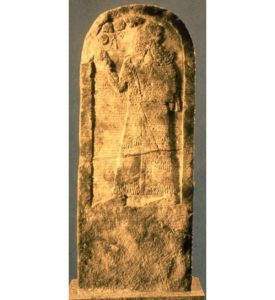


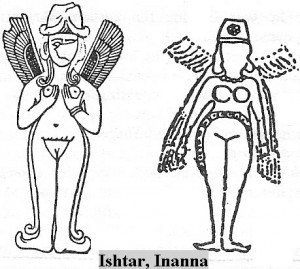

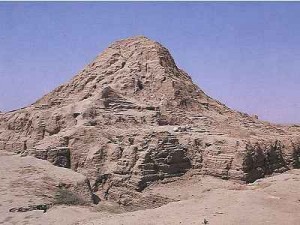
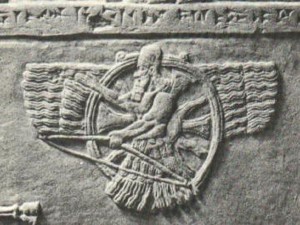
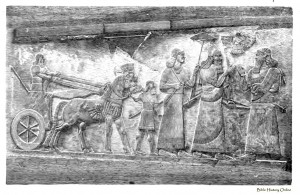
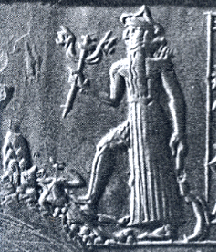
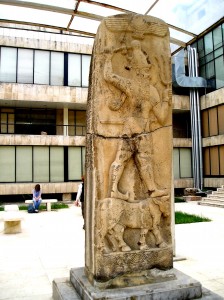

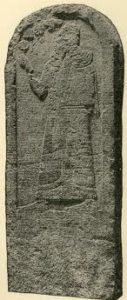

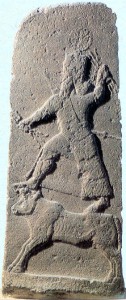
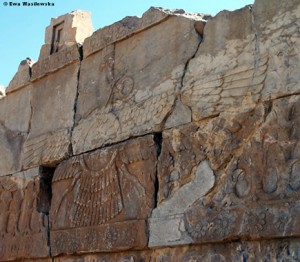
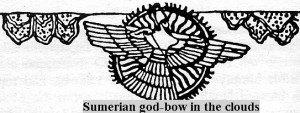
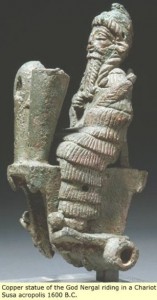
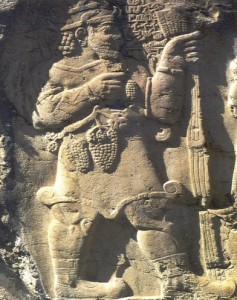
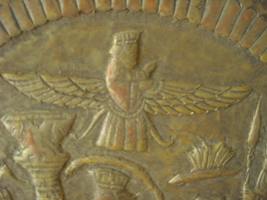
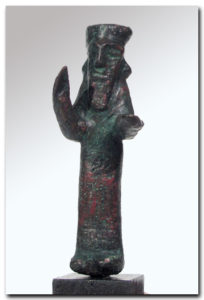

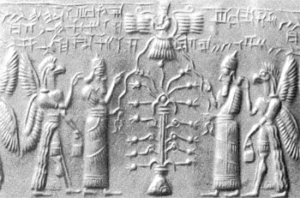
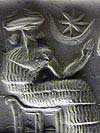
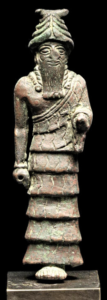
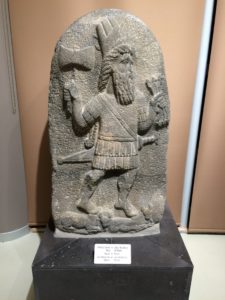
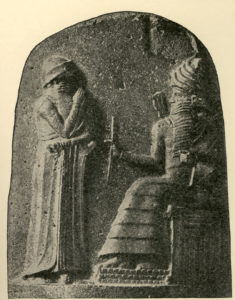
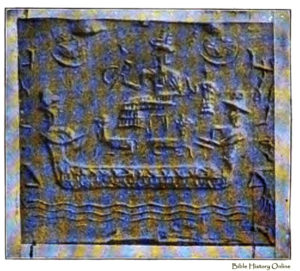
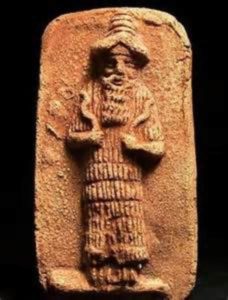
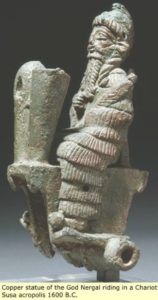
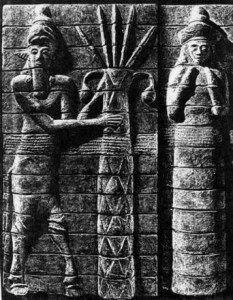
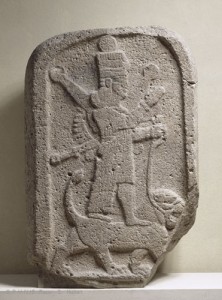
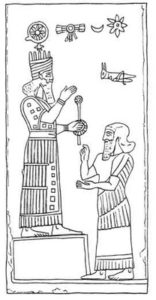
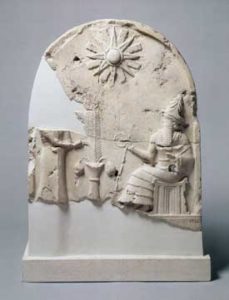
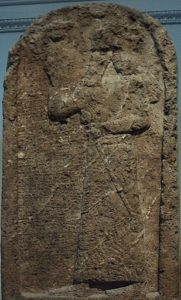
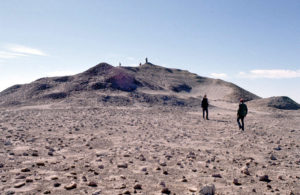
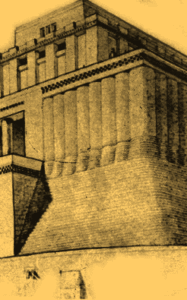
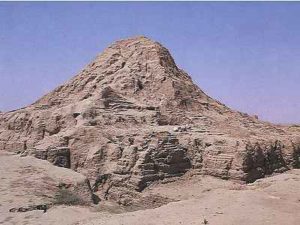

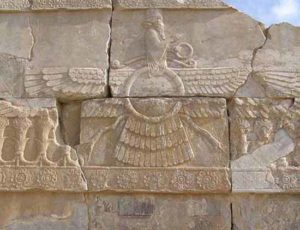
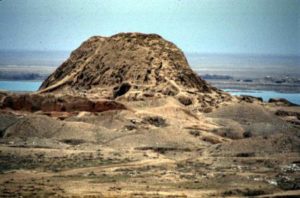
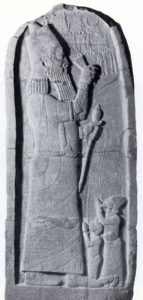
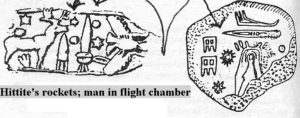
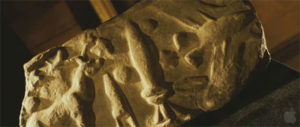
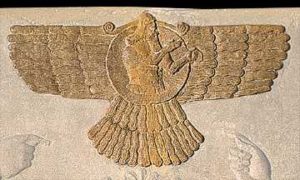
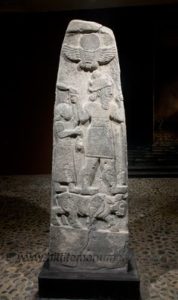
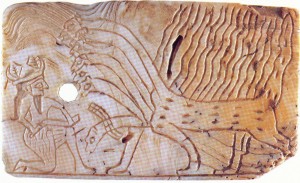






















 (
(





